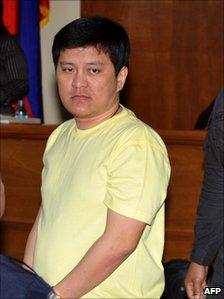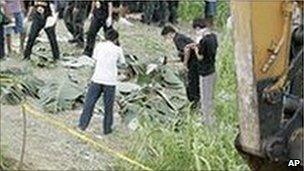The rise of the Ampatuan clan in the Philippines
- Published

Several of Andal Ampatuan Jnr's relatives hold office in Maguindanao
The main suspect in the most brutal massacre in recent Philippine history has gone on trial.
Andal Ampatuan Junior is accused of orchestrating the murder of 57 unarmed civilians, who were ambushed, killed and clumsily buried in a mass grave in the southern province of Maguindanao last November.
Another 27 members of his family have also been charged in connection with the killings - five are with him in custody - and they all deny the charges against them.
But for many Filipinos, this trial is about much more than establishing the guilt or innocence of one man, or even one family.
It's about the huge influence of clans like the Ampatuans, and the culture of impunity surrounding them.
While their involvement in the massacre has yet to be proven, there is no doubt whatsoever that the Ampatuans were - and still are - extremely powerful.
Loyalty to the president
The Ampatuans have been in Maguindanao for centuries, and can trace their lineage to a Muslim preacher, Shariff Aguak, who was one of the first people to bring the Islamic faith to the area.
But they were not always the dominant force they are today. According to Arnold Esguerra, a history professor at the University of the Philippines in Manila, the surname Ampatuan only started to appear in official documents in the early part of the 20th Century.
At that stage they were influential traders, he said - but their social status was definitely beneath that of the "datus", the traditional clan rulers.
The situation changed in the mid-1970s, when then-President Ferdinand Marcos declared martial law, and tried to stamp out the growing Islamic separatist movement by selecting a few people he could trust to administer the province.
One of those people was Andal Ampatuan Junior's father, Andal Senior, who is now the undisputed head of the family clan.
First, he became the mayor of Maganoy town - and then, during the presidency of Cory Aquino, he was given the more powerful role of officer-in-charge.
But it was under President Gloria Arroyo, who came to power in 2001, when the Ampatuans really came to prominence.
Andal Senior became governor of Maguindanao, a post he has now held for the maximum three terms. Then in 2005 his son Zaldy became the governor of the Autonomous Region of Muslim Mindanao - an influential post controlling the five Muslim provinces that have been given a degree of self-rule from central government.
'Heights of power'
Andal Junior became mayor of Datu Unsay, a town that bears his nickname, and at the time of the massacre, 10 of Maguindanao's 34 municipalities were run by Ampatuans or their relatives.
Mrs Arroyo's government was good to the Ampatuans, providing funds for the region, and in the process propelling Andal Senior to "undreamed-of heights of power", according to a report by the International Crisis Group.

Andal Ampatuan Jnr is accused of ordering the killings of 57 people
In 2006, Mrs Arroyo issued an executive order legalising the informal private "armies" being kept by families like the Ampatuans, enabling them to work alongside the regular army - but by extension legitimising their use as a means of local control.
In return the Ampatuans openly supported her in election campaigns.
There are widespread claims that the family helped rig votes for Mrs Arroyo in the controversial 2004 election, which she narrowly won. Both the Ampatuans and the former president deny the allegations.
At the time of the massacre, the clan had an estimated 28 mansions, scores of luxury cars, large amounts of rice-producing land and a heavily armed private army of more than 2,000 men.
According to the International Crisis Group, the Ampatuans also controlled the police, the judiciary and the local election commission, and possessed mortars, rocket launchers and assault rifles.
Even now, after the finger of blame has been pointed at them for the November massacre, the family still retains a lot of its influence. At least 15 Ampatuans won victories in May's election - some of whom have charges against them.
And according to Jessica Evans from Human Rights Watch, Andal Senior is still able to give orders to his subordinates from inside jail.
A unique case?
Of course none of this means the Ampatuans are necessarily guilty of the killings, or that all members of the clan act in a similar way.
In fact, according to Amina Rasul, director of the Philippine Council on Islam and Democracy, some Ampatuans are very effective and popular community leaders.
"They're not all cut from the same cloth. Many are professional, and have real support," she said.
But human rights groups are still concerned about the dominance of these family clans, and they warn that the influence and power exhibited by the Ampatuans is by no means unique.
"I don't think this is an isolated incident," said Amina Rasul. "There are other families in other parts of the Philippines that are just as powerful."
The Philippine military recently admitted that there were at least 112 private armies around the country - an indication, perhaps, of how many more clans and family groups hold sway over their own private fiefdoms.
Whether by chance or design, presidential policies over the past few decades have given certain families the opportunity to amass extraordinary levels of power and influence.
The first priority of the trial into last November's massacre is undoubtedly to bring justice for those who were so brutally killed.
But human rights groups are hoping that the case will also persuade the current government, under President Benigno Aquino, to bring an end to the dominance of families like the Ampatuans.
- Published24 June 2010